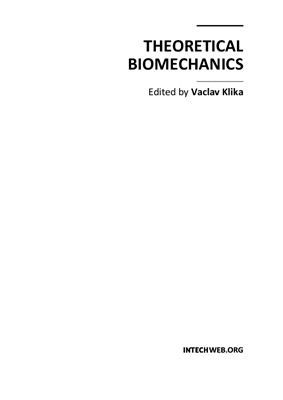InTech. 2011. 414 p.
During last couple of years there has been an increasing recognition that problems arising in biology or related to medicine really need a multidisciplinary approach. For this reason some special branches of both applied theoretical physics and mathematics have recently emerged such as biomechanics, mechanobiology, mathematical biology, biothermodynamics. This first section of the book, General notes on biomechanics and mechanobiology, comprises from theoretical contributions to Biomechanics often providing hypothesis or rationale for a given phenomenon that experiment or clinical study cannot provide. It deals with mechanical properties of living cells and tissues, mechanobiology of fracture healing or evolution of locomotor trends in extinct terrestrial giants. The second section, Biomechanical modelling, is devoted to the rapidly growing field of biomechanical models and modelling approaches to improve our understanding about processes in human body. The last section called Locomotion and joint biomechanics is a collection of works on description and analysis of human locomotion, joint stability and acting forces.
Contents
Preface
Part 1 General Notes on Biomechanics and Mechanobiology
Mechanical Properties of Living Cells and Tissues Related to Thermodynamics, Experiments and Quantitative Morphology – A Review
Mechanobiology of Fracture Healing: Basic Principles and Applications in Orthodontics and Orthopaedics
Evolution of Locomotor Trends in Extinct Terrestrial Giants Affected by Body Mass
Part 2 Biomechanical Modelling
Functional Data Analysis for Biomechanics
Biomechanical Computer Models
Biomechanics and Modeling of Skeletal Soft Tissues
Biomechanical Models of Endodontic Restorations
Development and Validation of a Three-Dimensional Biomechanical Model of the Lower Extremity
Feasible Simulation of Diseases Related to Bone Remodelling and of Their Treatment
Towards a Realistic and Self-Contained Biomechanical Model of the Hand
Part 3 Locomotion and Joint Biomechanics
Estimating Lower Limb Skeletal Loading
Physical Insights Into Dynamic Similarity in Animal Locomotion. I. Theoretical Principles and Concepts
Physical Insights Into Dynamic Similarity in Animal Locomotion. II. Observation of Continues Similarity States
Induced Acceleration Analysis of Three-Dimensional Multi-Joint Movements and Its Application to Sports Movements
Stability During Arboreal Locomotion
Biomechanical Assessments in Sports and Ergonomics
The Biomechanics of the Anterior Cruciate Ligament and Its Reconstruction
Biomechanics of the Neck
During last couple of years there has been an increasing recognition that problems arising in biology or related to medicine really need a multidisciplinary approach. For this reason some special branches of both applied theoretical physics and mathematics have recently emerged such as biomechanics, mechanobiology, mathematical biology, biothermodynamics. This first section of the book, General notes on biomechanics and mechanobiology, comprises from theoretical contributions to Biomechanics often providing hypothesis or rationale for a given phenomenon that experiment or clinical study cannot provide. It deals with mechanical properties of living cells and tissues, mechanobiology of fracture healing or evolution of locomotor trends in extinct terrestrial giants. The second section, Biomechanical modelling, is devoted to the rapidly growing field of biomechanical models and modelling approaches to improve our understanding about processes in human body. The last section called Locomotion and joint biomechanics is a collection of works on description and analysis of human locomotion, joint stability and acting forces.
Contents
Preface
Part 1 General Notes on Biomechanics and Mechanobiology
Mechanical Properties of Living Cells and Tissues Related to Thermodynamics, Experiments and Quantitative Morphology – A Review
Mechanobiology of Fracture Healing: Basic Principles and Applications in Orthodontics and Orthopaedics
Evolution of Locomotor Trends in Extinct Terrestrial Giants Affected by Body Mass
Part 2 Biomechanical Modelling
Functional Data Analysis for Biomechanics
Biomechanical Computer Models
Biomechanics and Modeling of Skeletal Soft Tissues
Biomechanical Models of Endodontic Restorations
Development and Validation of a Three-Dimensional Biomechanical Model of the Lower Extremity
Feasible Simulation of Diseases Related to Bone Remodelling and of Their Treatment
Towards a Realistic and Self-Contained Biomechanical Model of the Hand
Part 3 Locomotion and Joint Biomechanics
Estimating Lower Limb Skeletal Loading
Physical Insights Into Dynamic Similarity in Animal Locomotion. I. Theoretical Principles and Concepts
Physical Insights Into Dynamic Similarity in Animal Locomotion. II. Observation of Continues Similarity States
Induced Acceleration Analysis of Three-Dimensional Multi-Joint Movements and Its Application to Sports Movements
Stability During Arboreal Locomotion
Biomechanical Assessments in Sports and Ergonomics
The Biomechanics of the Anterior Cruciate Ligament and Its Reconstruction
Biomechanics of the Neck

